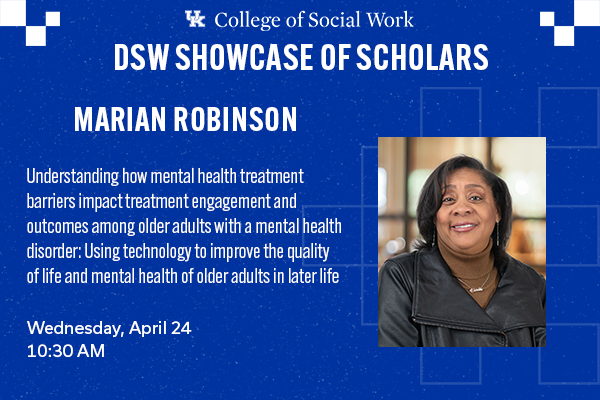DSW Candidate – Marian Robinson, LCSW, ACSW, 10:30 AM – 11:45 AM
$0.00
Virtual Showcase of DSW Scholars 2024 Event!
Understanding how mental health treatment barriers impact treatment engagement and outcomes among older adults with a mental health disorder: Using technology to improve the quality of life and mental health of older adults in later life
DSW Candidate – Marian Robinson, LCSW, ACSW
Wednesday, April 24, 2024
10:30 AM – 11:45 AM Eastern Time Zone
Credit Hours: 1.0
Description
Understanding how mental health treatment barriers impact treatment engagement and outcomes among older adults with a mental health disorder: Using technology to improve the quality of life and mental health of older adults in later life
The presentation focuses on developing knowledge and understanding how mental health treatment barriers impact treatment engagement and outcomes among older adults with a mental health disorder. By 2030, the proportion of people aged 65 and over will rise sharply from 10% in 2000 to 24%. This ongoing demographic shift over the years has increased the proportion of older adults in the mental health care system who face mental health challenges in later life. However, due to external and internal barriers, as well as misconceptions and stigmas about aging, research shows that older adults are less likely to receive mental health treatment than younger adults.
This presentation addresses the rise of mental health disorders among the aging population, particularly those aged 65 years or older, and how the lack of treatment engagement influences and increases the use of health care systems and undiagnosed or untreated mental health disorders lead to adverse consequences such as impaired quality of life, frequent doctor’s visits and use of emergency services, substance abuse, high mortality rates, and health care costs. The presenter explains how the use of theoretical frameworks, Andersen’s Behavioral Model of Health Care Utilization, and Stereotype Embodiment Theory will shed light on how to best move forward with innovative strategies, programs, and interventions to increase mental health literacy and treatment engagement among older adults in later life. The presenter shows how the use of Reminiscence-Based Digital Storytelling (DST) with Information Communication Technology (ICT) is a relevant, appropriate, and practical intervention in working with aging adults with mental health disorders such as depression, anxiety, and more.
Learning Objectives:
- Identify current mental health disorders and etiologies affecting the aging populations.
- Demonstrate awareness of current mental health treatment barriers impacting treatment engagement and outcomes among older adults.
- Interpret the use of theoretical frameworks, Andersen’s Behavioral Model of Health Care Utilization, and Stereotype Embodiment Theory in developing new innovative strategies, programs, and interventions to enhance older adults’ mental health literacy.
Delivery Method: Live Interactive Training via Zoom Video Conferencing
Credit Hours: 1.0 (ACE)
Target Audience: This conference is intended for social workers and students.
Accreditation: University of Kentucky College of Social Work, Provider # 1377, is approved as an ACE provider to offer social work continuing education by the Association of Social Work Boards (ASWB) Approved Continuing Education (ACE) program. Regulatory boards are the final authority on courses accepted for continuing education credit. ACE provider approval period: 9/29/22-9/29/25. Social workers participating in this conference will receive up to 15 general continuing education credits.
Claiming CE Credit: Instructions for claiming CE credit will be disseminated at the beginning of each session.
Questions: If you have any questions regarding CE credit or to report a grievance, please contact Melissa Whitaker at melissa.whitaker@uky.edu. For technical assistance, please contact lmshelp@uky.edu.
